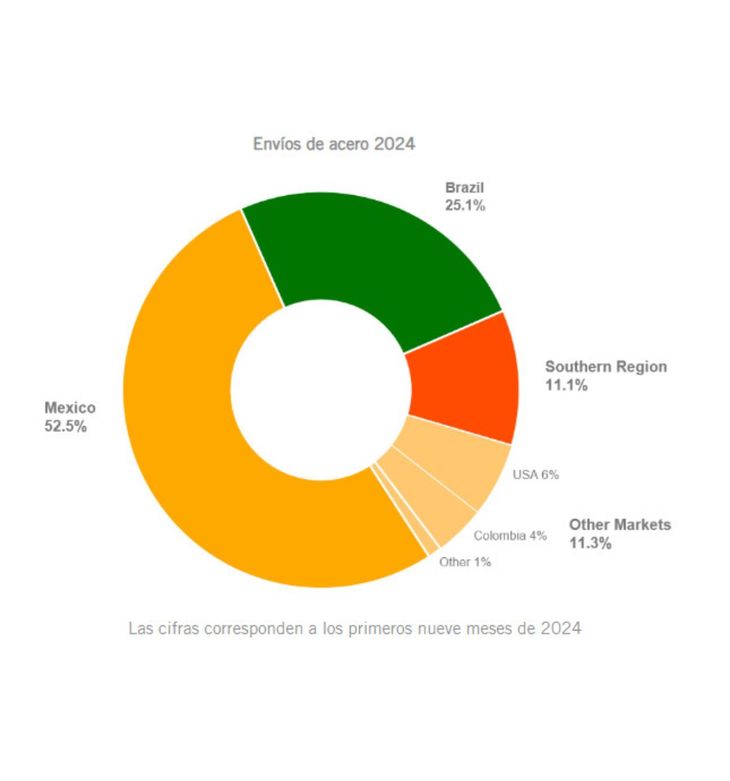According to official data and American Iron and Steel Institutethe main steel exporters to the US are Canada, Brazil and Mexicofollowed by South Korea and Vietnam. As for aluminum, Canada widely dominates the list, since it represents 79% of US imports in the first 11 months of 2024, thanks to its hydroelectric production.
That is why the answer from Canada soon arrived. Innovation Minister François-Philippe Champagne, wrote in X: “Canadian steel and aluminum support key industries in the US, from defense to naval construction and automotive. We will continue to defend Canada, our workers and our industries. “
Impact on the Argentine industry
Leonardo Anzalone, Director of Center for Political and Economic Studies (CEPEC)explains in statements to Scopethat Trump’s announcement on the imposition of 25% tariffs on steel and aluminum imports raises new “more than significant” difficulties For the Argentine metallurgical industryparticularly for companies such as Aluar and the companies of the Techint Group like Tenaris and Ternium“which are key actors in the export of these metals.”
For Anzalone, companies such as Aluar, which allocates around 65% of its production of primary export aluminum, could face a considerable decline in the demand of their products due to the price increase resulting from tariffs. “Consequently, an important decrease in local production could be given, which could have direct consequences on employment and value chain associated with these industries. “
industrial.jpg
Trump’s announcement about new steel and aluminum tariffs could generate significant difficulties for the Argentine metallurgical industry.
To this we must add that, a strong weight or a “backward dollar“They worsen the situation of Argentine metallurgical companies, because they would further reduce their competitiveness in the international market. By more expensive costs in dollars, these companies would face greater difficulties to export, particularly when they must already deal with tariffs imposed by Trump.
And it is that the combination of lower external demand and an unavailable exchange rate aggravates the fall in production, which, as Anzalone explains, impacts fully on employment and the entire associated value chain. In addition, the reduction of income in dollars would limit the investment and expansion capacity of these companies, which deepens the loss of competitiveness of the Argentine metallurgical sector in the long term.
Daniel Rosatoof president of Argentine SME industrialists (IPA), considers that the increase in tariffs proposed by the US government, “was something predictable.” For the businessman, Trump had announced this measure and sought to implement it for all steel and aluminum supplier countries, as is the case of Argentina.
And he warns that: “Although he did not take Argentine manufacturers by surprise, it should be a reason for reflection for the national government, so that, in some way, it can replicate these actions that Trump carries out to benefit the US industry and Entrepreneurs who invest and produce in North America, “says Rosato.
For IPA, this increase in tariffs is part of a process that “pIt is robbly not limited to steel and aluminum, but affects a long list of products and goods“, which negatively impact the US industry in this context, Rosato believes that Argentina should take this as an example,” given that the country loses competitiveness day by day “, which implies the closure of numerous companies and The loss of thousands of jobs. “It is an opportunity for the government to reflect and consider US actions as a model to follow,” concludes Rosato.
The strategy to follow, according to experts
In that context, it should be remembered that so much Tenaris (Ten) as Ternium (Txar) They quote on Wall Street. In the last month, he has a red 0.9% while Txar climbed almost 3%. The attention of investors will go on Monday due to the impact on the papers of the country’s metallurgical companies.
The investment advisor, Gastón Lentiniindicates in statements to this medium that the first reaction that the markets should observe is that all the metallurgical ones in the world, except the Americans, adjust the downward prices, with a limit around US $ 60. This is because it will be more expensive for these companies to sell within the US. So “Arceormittal, Ternium, Siderar and AluaR Do not seem to have a panorama too different, “
Lentini explains that these are companies that, although they export part of their production, “depend mainly on domestic demand”, strictly speaking, on the so longed for reactivation of sectors such as the construction and consumption of goods as Appliances, plates and windows.
On the other hand, Ternium and Aluar, with poor performance in 2024, are in a delayed position in relation to other Argentine companies, “which could open a Interesting Attractive Pricesas long as there is a reactivation in the real estate sector and in the demand for consumer goods, “warns the strategist.
Ternum.jpeg

Ternium 2024. Source: The doctor of your finances.
On the other hand, Letini slides that is worth, the American iron mining company, “it could be affected again.” Although it agrees that there may be a new opportunity for long -term investors. “The company was already affected by the crisis in Brazil and the fall in the demand for iron and steel mineral from China due to its crisis,” he says. If long -term ratios are observed, it could be attractive to patient investors seeking risks and focus on the long term.
And it is that the extension of Trump’s tariff measures is not yet entirely clear. The US president also mentioned the possibility of applying tariffs to other products such as medications, oil and semiconductors, in addition to evaluating imports to the imports of the European Union (EU).
It should be remembered that last week, Trump implemented a 10% tariff on Chinese products, which caused Beijing to announce retaliation measures, that will be implemented at the end of this monthaimed at US goods for a value of US $ 14 billion, so, in one way or another, both Argentina and the rest of the exporting countries will at some time feel the onslaught of this new commercial war.
Source: Ambito
I’m a recent graduate of the University of Missouri with a degree in journalism. I started working as a news reporter for 24 Hours World about two years ago, and I’ve been writing articles ever since. My main focus is automotive news, but I’ve also written about politics, lifestyle, and entertainment.




